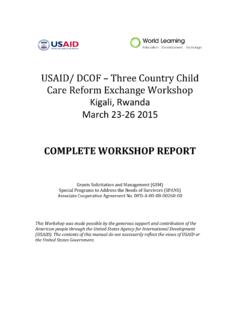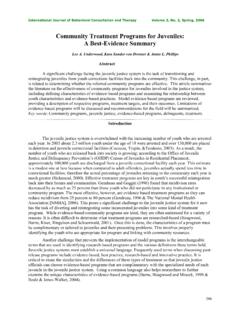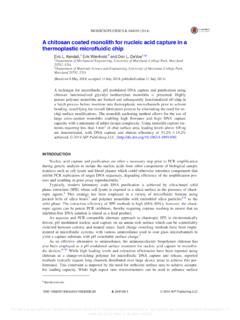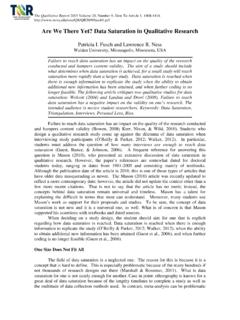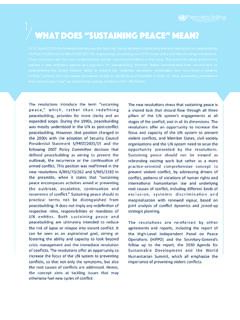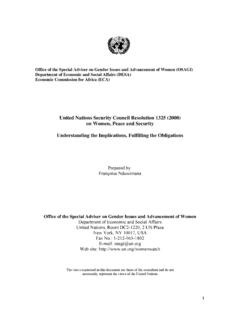Transcription of SERVICE DELIVERY MODEL FOR DEVELOPMENTAL SOCIAL …
1 SERVICE DELIVERY MODEL FOR DEVELOPMENTAL SOCIAL SERVICES FINAL SERVICE DELIVERY MODEL OCTOBER 2005 1 FOREWORD BY THE MINISTER OF SOCIAL DEVELOPMENT The DELIVERY of services to the masses of our country remains a complex process. A DEVELOPMENTAL framework demands interrelated, intersectoral and integrated SERVICE DELIVERY from the many sectors and government departments involved. For it to be successful, this collaboration and coordination must be underpinned by the attitudes and values of the DEVELOPMENTAL approach , and good relations between national, provincial and local government are essential. Over the past decade, the notion of what constitutes DEVELOPMENTAL SOCIAL services has been a matter of debate, misunderstanding and misinterpretation. Since 1994, we have been engaged in discussions at various levels to ensure that our services benefit the poorest and most vulnerable sectors of society. In reaching out to the millions of our people who live in conditions of abject poverty, some deprived of access to even basic resources, there has been a shift in approach , from a welfarist to a SOCIAL development perspective.
2 This paradigm shift is premised on the notion that people are the masters of their own destiny and, instead of helping the poor in the traditional way with handouts, it moves on to the development and empowerment of individuals, groups and communities, teaching them to be self-reliant. We believe that this is the best way for the Department and its partners to combat the socio-economic challenges facing the country. Our belief is that such efforts will strengthen the system through which services are rendered and promote the general welfare and development of our people. This SERVICE DELIVERY MODEL depicts our relentless efforts to improve SERVICE DELIVERY to the poorest of the poor and all the other vulnerable groups in our society, while providing an indication of the resource requirements for effective implementation. 2 We hope that the MODEL will help all of us to confront the challenges of SERVICE DELIVERY that we have had to face in the past decade.
3 More importantly, we hope the SERVICE DELIVERY MODEL will turn the tide and ensure the enhancement of closer working relationships between all those striving for SOCIAL justice and working together to achieve the common goal of "a better life for all . 3 ACKNOWLEDGEMENTS The Department wishes to express its sincere appreciation to the Transformation Task Team, which gave invaluable support in the process of developing the SERVICE DELIVERY MODEL . The team was made up of national and provincial representatives and was chaired by Ms N. Kela, Chief Director: Welfare SERVICE Transformation (National). It is through the team's efforts that, in spite of the challenges we face, we can say that we have laid the foundation for making a meaningful contribution to the millions of needy South Africans desperately awaiting our services. This report was written by - Ms M Davids Ms S Follentine Ms B Hlagala Ms CM Legodu Ms S Luka Mr H Mooketsi Mr W Ncapai Ms M Niemand Ms I Sikwane Ms Iveda Smith The contributions of Dr Kganakga, Ms Kgasi, Dr Mabetoa, Mr Mbonani, Ms Nhlapo and others in the Department are also appreciated.
4 The Department wishes to acknowledge the significant contributions made by stakeholders in all nine provinces, institutions of higher learning, the South African Council for SOCIAL SERVICE Professions, labour organisations, non-governmental organisations (NGOs), faith-based organisations (FBOs), community-based organisations (CBOs) and others that participated in consultative sessions and gave input on the document. Partnership with 4 organs of civil society remains a key element in the Department s efforts to ensure optimal functioning and the fulfilment of its mandate. 5 TABLE OF CONTENTS Executive .. 1. Introduction .. 2. Rationale for the SERVICE DELIVERY MODEL .. 3. Purpose of the SERVICE DELIVERY 4. Outcome 5. Values and principles for SERVICE 6. Policies and constitutional mandate .. 7. Key concepts .. 8. The development paradigm .. 9. SERVICE integration .. 10. SOCIAL welfare SERVICE DELIVERY .
5 11. Target groups .. 12. Nature and scope of community development services .. 13. SERVICE providers/institutional mechanisms .. for SERVICE 15. Norms and 16. Workstreams .. 17. Implementation and change management 18. Monitoring and 19. 6 EXECUTIVE SUMMARY The Department of SOCIAL Development renders services through the three broad programmes; SOCIAL Security, SOCIAL Welfare and Community Development. These programmes should be integrated and enable the target groups to deal effectively with all SOCIAL issues, such as psychological stress, chronic poverty, food insecurity and other adverse SOCIAL conditions. In order to do this a DEVELOPMENTAL approach to SERVICE DELIVERY is needed; an approach that is based on the strengths of the individual, group or community, and that recognises their capacity for growth and development. Recognising the need to promote the goals of sustainable development and to redress past imbalances, the SOCIAL services sector has adopted such an approach , integrating SOCIAL intervention with economic development.
6 Despite having adopted this approach , in recent years SOCIAL SERVICE practitioners have been forced to adopt a make do approach , their actions dictated by resource limitations rather than need, priority or statutory and internationally ratified obligations. The major goal of the SERVICE DELIVERY MODEL for SOCIAL Services is therefore to provide a comprehensive national framework that clearly sets out the nature, scope, extent and level of SOCIAL services, and which will form the basis for the development of appropriate norms and standards for SERVICE DELIVERY . The desired outcome of the SERVICE DELIVERY MODEL is the implementation of a comprehensive, efficient, effective and quality SERVICE DELIVERY system, which will contribute to a self-reliant society, and which is based on the principles of Batho Pele, the White Paper for SOCIAL Welfare, and the constitutional, legal and international obligations that inform the mandate of the Department in the provision of services.
7 7 The SERVICE DELIVERY MODEL for DEVELOPMENTAL SOCIAL Services acknowledges the interdependent relationship between the main programmes of the Department, namely SOCIAL Security, SOCIAL Welfare and Community Development, and provides a framework for the integration of the services of the Department's different programmes. However, SOCIAL issues are complex and multidimensional, so the need for SERVICE integration across departments and the effective use of clusters to facilitate this integration of development efforts is important. To this end the Department works on specific services with other departments and spheres of government to ensure that communities derive maximum benefit. While recognising the role of SOCIAL security, services are defined in terms of two broad categories that constitute DEVELOPMENTAL SOCIAL services, namely DEVELOPMENTAL SOCIAL welfare services and community development.
8 These are further delineated in terms of SERVICE classifications. DEVELOPMENTAL SOCIAL welfare services are classified in terms of levels of intervention which, although distinct, in practice overlap and are provided in a continuum. They are divided into prevention; early intervention; statutory, residential and alternative care; and reconstruction and aftercare services. All services are aimed at promoting the optimal functioning and the reintegration of beneficiaries into mainstream society. Core services are further classified into five broad categories, namely promotion and prevention; rehabilitation; protection; continuing care; and mental health and addiction services. These are then unpacked in terms of the primary target groups of the Department, which broadly comprise the poor and vulnerable sectors of society. The nature and scope of community development are articulated. These are classified in terms of the purpose and scope of services, and include a focus on the development of the youth and women, poverty reduction programmes, and 8 the registration and facilitation of non-profit organisations (NPOs).
9 These services are further classified in terms of the community development process, including the development of SOCIAL relationships, community profiling, planning and prioritisation, implementation, evaluation, documentation and facilitation, integration and coordination. Some preferred approaches, such as sustainable livelihood and participatory learning and action, are highlighted. The SERVICE DELIVERY MODEL acknowledges that DEVELOPMENTAL services are the collective responsibility of various role players, including government, non-governmental organisations and the private sector. The exact nature and extent of the involvement of these SERVICE providers is determined by history, expertise, statutory requirements and cost. Within this framework, the roles and responsibilities of SERVICE providers of government in different spheres, as well as SERVICE partners such as national bodies, non-governmental, community-based and faith-based organisations, and private practitioners are outlined.
10 This will ensure that role clarification is enhanced, and duplication and fragmentation prevented. All SERVICE providers need to ensure that services are integrated , coordinated and managed to maximise their benefits for society. In order to implement the SERVICE DELIVERY MODEL effectively, a range of human, financial, information management and other infrastructural resources are required. The allocation of resources in this regard will be determined by the development of appropriate norms and standards. The MODEL sets the basis for the development of such generic norms and standards, which still requires further research. To deliver effectively on the functions outlined in this MODEL , workstreams that can be utilised as a basis for structural alignment, particularly within government, have been developed. This will facilitate the coordination and integration of services, and improve communication and joint planning.
